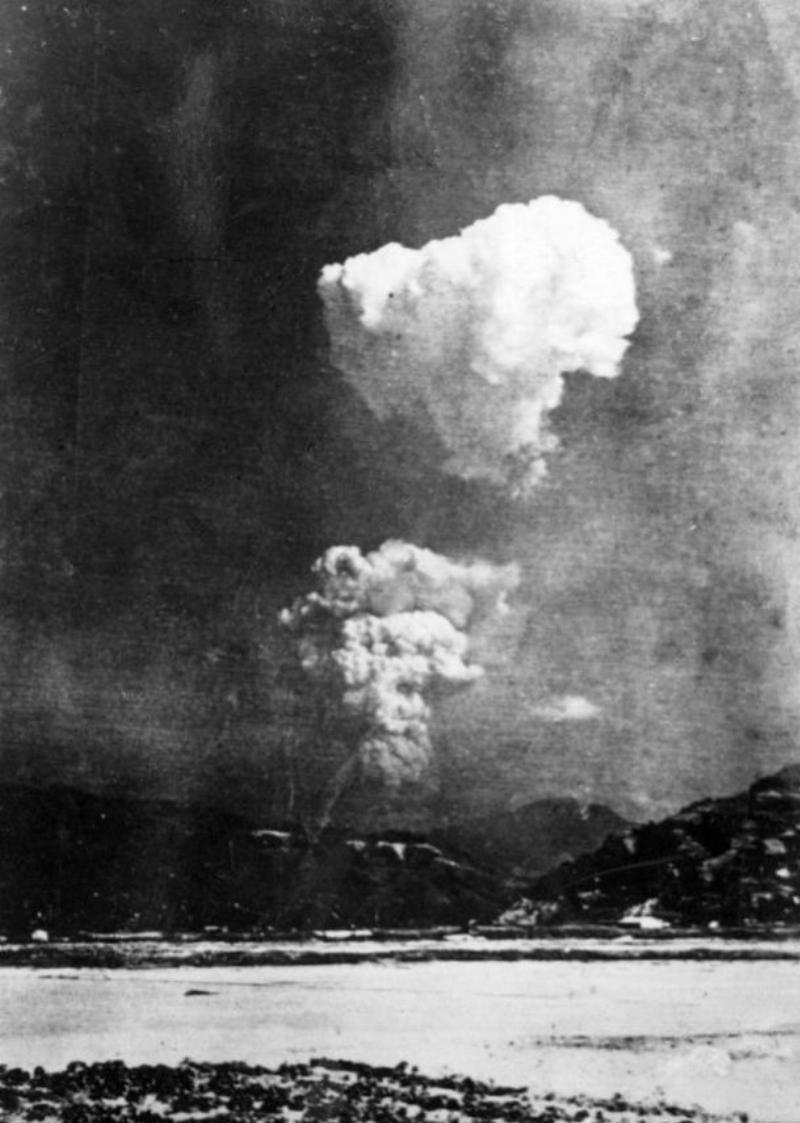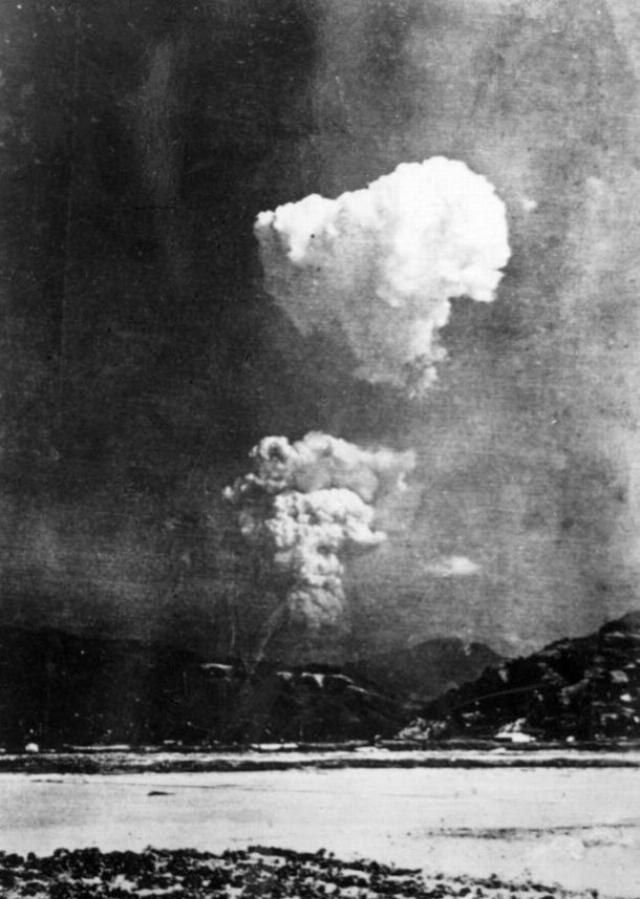


“If you find yourself arguing that it’s a good thing to drop nuclear weapons on people, then you are evil.”
Thus spake Tucker Carlson last year on Joe Rogan’s podcast after the Daily Wire’s Jeremy Boreing claimed on Twitter that people who condemn the dropping of the bombs and describe the United States as evil for doing so, hate their country.
Boreing and Carlson were replaying an argument that has been on a loop ever since the Sixties: Was Truman’s decision to drop the bombs justified? As an historical debate, there will probably never be an end to it. History is an argument forever and ever, words without end, amen. And it doesn’t matter how asinine or crazy some of the so-called theories are. Arthur Schlessinger, Jr. accurately described A People’s History of the United States as a “deranged fairytale,” but that hasn’t stopped it from becoming a classroom textbook still in use today.
What is most infuriating about Carlson, Candace Owens, and the other “America sucks!” “conservatives” is not that they are asking stupid questions. It is that they are wrapping themselves up in the mantle of patriotism for doing so. Condemning not just Truman but the United States as a whole for the bombings is, to these people, “the most patriotic thing an American can do,” an act that separates the patriot from the “American barbarian.” It’s the mirror image of the Left describing the burning of American flags (or Minneapolis) as “the highest form of patriotism!”
It’s all baloney.
And on the eightieth anniversary of the atomic bombing of Hiroshima, all American patriots not only need to recognize it as baloney but as unpatriotic oikophobia.
The essence of patriotism is loving your country as you would love a parent or a spouse, not simply using her; that’s what’s escorts are for. And, just as good men put their mothers and their wives ahead of their own needs and plans, patriotism demands that we put the country ahead not just of our own good but of our family. The Cavalier poet, Richard Lovelace, captured this sentiment in his poem “To Lucasta, On Going to the Wars;” the last two lines are a punch in the gut both to Lucasta and to us: “I could not love thee (Dear) so much/Lov’d I not Honour more.” For Lovelace, the honor in question came from “A sword, a horse, a shield,” used to fly to the civil war which was tearing 17th century England part. Here at home, Fitzgreene Halleck’s “A Song” made the connection directly, writing that the Union soldiers, “[A]t Honor’s bidding/Stepped, their country’s life to save,/To war as to their wedding.” If poetry isn’t butch enough, John Adams expressed the same sentiment in 1808, telling his friend, Dr. Benjamin Rush, that “Our Obligations to our Country never cease but with our Lives.” These obligations included Time, Treasure (resources), and Blood, the three most precious things a man can sacrifice.
 These reflections, poetical or not, capture an essential quality of patriotism: its pre-rational nature. What was rational about volunteering to fight in the Civil War? If your county was in Vermont or Connecticut, what did it matter if South Carolina and Louisiana went their own ways? What was rational about fighting the greatest empire of the 18th century with no professional army or navy? No one advances a parliament of syllogisms to metaphysically prove why he loves his mother or his wife and no one ever should. It is a state of being that simply flows from the facts that you have a mother and you have a wife. You cannot prove first principles and if you make the attempt, it is a sign that something has already gone horribly wrong. Like the alt-Right used to say: If you have to make something illegal, you’ve already lost the issue.
These reflections, poetical or not, capture an essential quality of patriotism: its pre-rational nature. What was rational about volunteering to fight in the Civil War? If your county was in Vermont or Connecticut, what did it matter if South Carolina and Louisiana went their own ways? What was rational about fighting the greatest empire of the 18th century with no professional army or navy? No one advances a parliament of syllogisms to metaphysically prove why he loves his mother or his wife and no one ever should. It is a state of being that simply flows from the facts that you have a mother and you have a wife. You cannot prove first principles and if you make the attempt, it is a sign that something has already gone horribly wrong. Like the alt-Right used to say: If you have to make something illegal, you’ve already lost the issue.
In this way, G.K. Chesterton was totally off the mark when he equated “My country right or wrong!” with “My mother drunk or sober!” Whether or not your mother is drunk or not, she is still your mother. Regardless of what your country does, she is still your country; you belong to her, and she belongs to you. If your mother is drunk, you will quietly correct her because you love her. And if your country commits a crime, you will point it out because you love her. But, in both cases, you will not act off of rumor, innuendo, hearsay, or scuttlebutt but only with facts. And facts are what Carlson, Owens & Co. conveniently ignore when it comes to the dropping of the bombs.
If the bombs had been dropped on a Japan that was on the verge of surrendering, Carlson and his parrots would have a leg to stand on. But Japan was not going to surrender. American military had firsthand knowledge of this fact: At Iwo Jima, of the 21,000 Japanese soldiers on the island, only 216 surrendered; 3,000 retreated to the nest of tunnels built in preparation for the American invasion and, from which, guerilla attacks were launched until January 1949. At Saipan, American soldiers witnessed Japanese women throwing themselves off cliffs into the Pacific holding their babies. Even after Nagasaki, surrender was not on the table; Army Chief Anami Korechika, who dominated the six-man Supreme War Council, insisted that there was still a pathway to victory: “The appearance of the atomic bomb does not spell the end of war… We are confident about a decisive homeland battle against American forces.”
That “decisive homeland battle” was where Ketsu Go (Operation Decisive) came into play. The Imperial Japanese government drafted all men between 15 and 60 and all women between 17 and 40, a full quarter of the Japanese population. These draftees were not distinguished in any way from actual civilians and were, according to Japanese historian, Sadao Asada, to kill themselves fighting the enemy via kamikaze planes, mini submarines rigged to be torpedoes, suicide charges of bamboo speared women against American tanks. It is important to understand that Ketsu Go was not a last-ditch military strategy but a coldly calculated psychological gambit. The Japanese believed that American soldiers were weak and that they would become so sickened of killing 18-year-old girls and 60-year-old men and so demoralized by non-stop suicide attacks, that the entire invasion force would literally sit down and stop fighting. President Truman would then be forced to negotiate, withdrawing all American troops from around Japan and leaving the imperial government in place. Only Hirohito’s unprecedented act of personally ordering the immediate surrender of all Japanese forces by radio ended the Pacific war in August of 1945. Korechika and hundreds of his officers committed suicide after the order was given.
Like only a handful of nations throughout history, the United States has been a force of good throughout the world, not only because we have defeated genuine tyrants but because of our example of republican self-government. The bombings of Hiroshima and Nagasaki belong in the former category. Carlson and others may claim to love their country, but when they condemn her and us against the facts of history, the truth is easy to spot.
Image: Honkawa Elementary School
